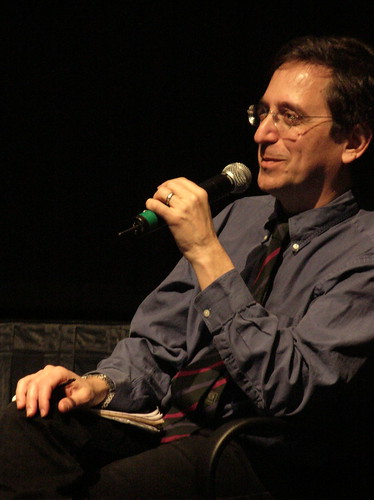Environmental journalist Andrew Revkin (photo on Flickr by AKM Adam).
Andrew Revkin, environmental reporter for the New York Times, spoke this afternoon on day two of the Planet Under Pressure conference in London this week.
The formal title of this session, ‘The digital age and tipping points in social networks: Opportunities for planetary stewardship’, was in keeping with the elevated ambitions of the global change community meeting here.
‘Human beings are really bad at solving this kind of (planetary) problem’, Revkin opined in his opening statement (opining being his professional business).
He recalled world interest in ‘Noosphere’, a kind of planetary intelligence coined by Teilhard de Chardin to refer to the third stage of planetary development, coming after ‘geosphere’ (inanimate development) and ‘biosphere’ (biological life).
Just as the emergence of life fundamentally transformed the geosphere, the emergence of human cognition fundamentally transforms the biosphere. In contrast to the conceptions of Gaia theorists, or the promoters of cyberspace . . . noosphere emerges at the point where humankind, through the mastery of nuclear processes, begins to create resources through the transmutation of elements.’ — Wikipedia
Revkin noted Darwin’s remark in 1881 that we are all tribal—and that the reason we are all tribal is that we don’t know each other yet. That, of course, is changing dramatically with social media, he said.
‘We have a new set of tools for sharing ourselves. And I see great potential for its enhancing (sustainable) progress on our planet’, the New York Times journalist said.
‘Although the last thing the world needs is a new word’, continued Revkin, I offer “knowosphere”—a network of schools, libraries and so on making up a great global classroom. In this virtual classroom, students in Scotland and Ghana are conferring with each other right now on the topic of the rising waters of the Atlantic.’
Can we then expect a world of ‘scientists without borders’? Revkin asks, and then, answering himself, remarked, ‘It’s still early days’.
The hash tag, Revkin concluded, was invented by a guy at Mozilla as the San Diego fires were burning; he wanted to track talk of the fires. And that was the beginning of our ‘focussed discussions’ online.
‘It’s open season across time and space’, Revkin concluded. Time to ‘get out of the nerd loop’, he advised his (nerdy) audience.
Environmental scientist Amy Luers
Amy Luers, an environmental scientist formerly at Google.org and now at the Skoll Global Threats Fund, spoke next, promoting ‘boundary networks’ and ‘boundary spanning mechanisms’ linking formal and informal science and cross-cultural and societal norms.
She referred to ‘citizen science’, saying we’re at a tipping point.
‘Earth systems science needs to be more integrated into societies management and policy decisions’, Luer argued. ‘The digital age creates both opportunities and challenges in addressing this need.’
A remarkable 600 million people now have cell phones, she said. So it’s not about starting conversations but rather about joining conversations. ‘Much of the global change community has been reluctant to cross this line between telling a story and joining a conversation’, Luer warned.
Scientists are engaging in the social web, but the challenges remain, she said. ‘I sit in the non-acadmeic world now but work in the field of sustainability, and nobody I know had heard about this (Planet Under Pressure) conference!’
Luer ended with an interesting (perhaps irrelevant, certainly provocative) statistic:
Less than 20 per cent of Americans actually know a scientist—most scientists live in college towns, and only 9 per cent are Republicans!
Read more about the Planet Under Pressure conference on the ILRI News Blog
Planet under pressure / Livestock under the radar, 26 Mar 2012.
Planet under pressure / A numbers game–but which numbers are the numbers that matter?, 26 Mar 2012.
Planet under pressure / Food security policy brief, 27 Mar 2012.


